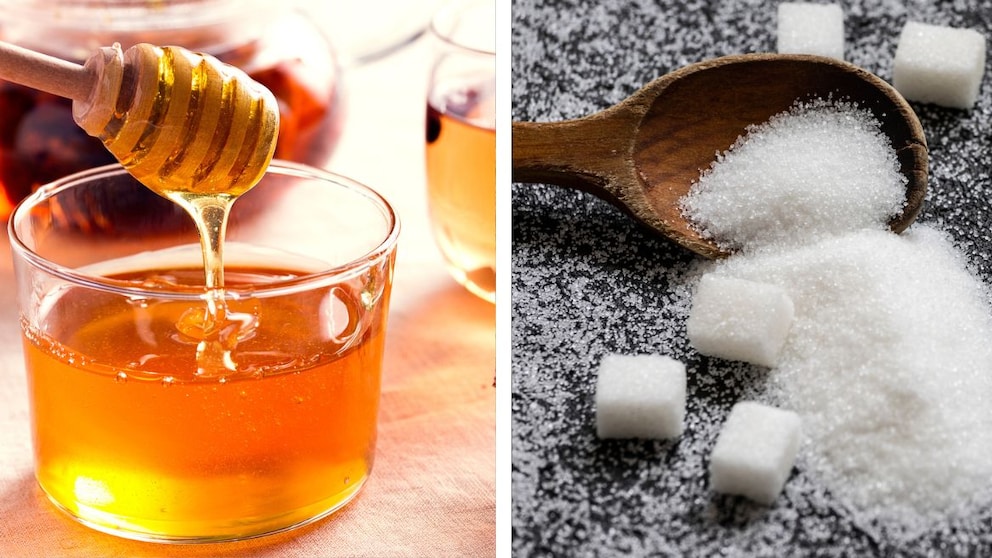October 22, 2024, 1:35 pm | Read time: 5 minutes
White sugar is an industrial product; honey is a natural one. So it’s not difficult to choose which food is healthier, is it? But what nutrients are actually in sweeteners, and are there really any health differences? FITBOOK nutrition expert Sophie Brünke explains.
When it comes to white household sugar, most people think of obesity, diabetes, and tooth decay. Honey, on the other hand, is a healthier and natural alternative. Does honey, which bees actually collect as a food supply for the winter, rightly have the better image? FITBOOK makes the comparison.
Overview
Sugar and honey – what’s in them?
Whether in tea, desserts, or baked goods, sugar and honey are both popular sweeteners. However, with the same amount of honey, you can save a few calories. This is because honey, unlike white household sugar, is composed of about 20 to 25 percent water, with the remainder being primarily sugar. Proteins, vitamins, minerals, colorants, and flavorings make up around one to three percent.1 The water content in white sugar is negligible at 0.12 percent.2
Now, of course, it depends on how much of it you eat and how much energy you can actually save. The German Nutrition Society advocates consuming a maximum of 50 grams of free sugar per day (or ten percent of total energy intake).3 In other words, sugar that was not previously contained in the food and that we add ourselves, e.g., the teaspoon of sugar in our coffee. Assuming you consume this daily amount, 50 grams of honey provides around 50 calories less than the equivalent amount of pure sugar. This corresponds to about one small apple. Therefore, the calorie savings are modest but could be combined with other calorie-saving strategies if one aims to reduce or maintain weight. But be careful: This small deficit should not tempt you to sweeten more generously with honey. Otherwise, it will have the opposite effect.
Honey contains more fructose
There are different types of sugar. Perhaps you know someone with a lactose intolerance, for example, as they cannot tolerate lactose. In the case of household sugar, it is sucrose, a disaccharide, which is made up of the simple sugars glucose (dextrose) and fructose (fruit sugar). Honey also contains these two simple sugars. Thanks to the enzyme invertase, however, they do not form deposits, and the honey remains liquid. Only over time, when the enzyme activity decreases, does the sucrose slowly crystallize at the bottom of the honey jar. So much for the chemical background – it doesn’t get any more complicated than that, I promise!
So, is honey merely liquid table sugar? Not quite. The proportion of fructose is slightly higher. This makes honey taste a little sweeter. However, consuming fructose in large quantities can have a laxative effect. This leads to flatulence, diarrhea, and abdominal pain. Therefore, it is advisable not to consume the mentioned 50 grams all at once.
Does the blood sugar level prefer honey or sugar?
Fructose used to be praised by diabetics. This is because it requires slightly less insulin to enter the body’s cells. However, both sweeteners cause blood sugar and insulin levels to rise, and the differences are small. There are studies that suggest that consuming honey could have a positive effect on blood sugar levels and cholesterol levels in the long term. However, further research is necessary in this area.
Honey provides hardly any valuable nutrients
As mentioned, there are also a few vitamins and minerals in the sticky bee product. Potassium, vitamin C, and iron are often mentioned in this context. Honey contains 45 milligrams of potassium per 100 grams, and the maximum permitted 50 grams contains around 23 milligrams. However, an adult needs 4000 milligrams of this mineral every day – and the best way to get it is through something other than numerous jars of honey.4 Likewise, the vitamin C and iron contained in honey only make up a fraction of the requirement and are not suitable for meeting it.

Expert Clarifies Granola Versus Muesli – Which is Healthier?

Nutrition myths fact-checked Better weight loss with lemon water before breakfast? Here’s what an expert says

Expert clarifies Is Greek yogurt healthier than natural yogurt?
Conclusion
Honey and sugar are primarily sources of high-calorie energy and are not suitable for fulfilling the body’s requirements for vitamins or minerals. Although honey provides slightly fewer calories due to its water content, both foods should be sweetened sparingly, as high consumption can promote chronic diseases such as obesity and type 2 diabetes.

